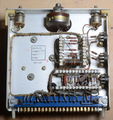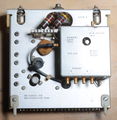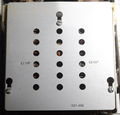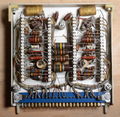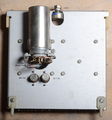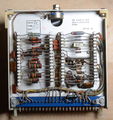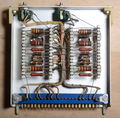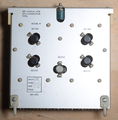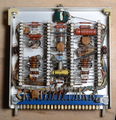4S2: Difference between revisions
No edit summary |
No edit summary |
||
| Line 17: | Line 17: | ||
Signals enter the 4S2 through [[GR-874 connector]]s on the front panel. | Signals enter the 4S2 through [[GR-874 connector]]s on the front panel. | ||
Unlike the [[4S1]], the 4S2's signal path does not contain a [[delay line]] between the input connector and the sampler. | Unlike the [[4S1]], the 4S2's signal path does not contain a [[delay line]] between the input connector and the sampler. | ||
This has the advantage of maintaining higher pulse fidelity and thus higher bandwidth | This has the advantage of maintaining higher pulse fidelity and thus higher bandwidth, | ||
but the disadvantage of making it impossible to see the leading edge of the triggering event unless a pre-trigger is used. | |||
The 4S2 uses a four-diode sampling bridge. The 4S2A uses a two-diode sampling bridge. | The 4S2 uses a four-diode sampling bridge. The 4S2A uses a two-diode sampling bridge. | ||
| Line 69: | Line 69: | ||
[[Category:661 plugins]] | [[Category:661 plugins]] | ||
[[Category:Sampling plugins]] | [[Category:Sampling plugins]] | ||
[[Category:GR874]] | |||
Revision as of 03:04, 4 August 2018
Template:Plugin Sidebar 2 The Tektronix 4S2 is a two-channel sampling vertical plug-in for the 661. Signals enter the 4S2 through GR-874 connectors on the front panel. Unlike the 4S1, the 4S2's signal path does not contain a delay line between the input connector and the sampler. This has the advantage of maintaining higher pulse fidelity and thus higher bandwidth, but the disadvantage of making it impossible to see the leading edge of the triggering event unless a pre-trigger is used.
The 4S2 uses a four-diode sampling bridge. The 4S2A uses a two-diode sampling bridge. This design change is discussed in the 4S2A Engineering Spec document linked below. The 4S2 does not provide trigger pick-off. The 4S2A provides trigger pick-off.
Key Specifications
| Bandwidth | DC to 3.9 GHz |
|---|---|
| Rise time | 90 ps |
| Deflection | 2 mV/Div to 200 mV/Div, 1−2−5 |
Pictures
-
-
-
-
-
42SA sampler schematic
-
42SA pulse generator schematic
-
4S2 Pulse Generator
-
4S2 Pulse Generator
-
4S2 Pulse Generator
-
4S2 Pulse Generator
-
4S2 Sampler
-
4S2 Sampler
-
AC Amplifier
-
AC Amplifier
-
Memory
-
Memory
-
Inverter
-
Inverter
-
Dual Trace
-
Dual Trace
-
4S2
-
4S2
-
4S2
-
4S2
-
4S2
-
4S2
-
4S2
-
4S2 Samplers
-
4S2 Top
-
4S2 Top Front
-
4S2 Top
-
Pulse Generator Card Removed, Var Gain Pots
-
4S2 Rear






